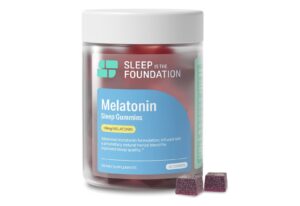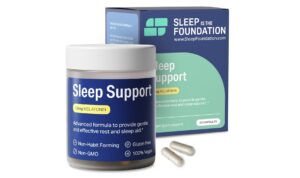When you buy through our links, we may earn a commission. Products or services may be offered by an affiliated entity. Learn more.
Does Melatonin Affect Birth Control?
Melatonin is a naturally occurring hormone produced by the brain after exposure to darkness. This hormone works as part of our daily fluctuating circadian rhythms and helps us feel sleepy when it’s time for bed. Without enough melatonin, we would continue feeling alert later than usual and likely have trouble sleeping. Melatonin is the primary reason our sleep-wake schedules correspond with darkness and daylight.
Synthetically made melatonin is available over the counter without a prescription and primarily used as a sleep aid. Experts say supplemental melatonin works best for jet lag, delayed sleep-wake phase disorder, some sleep disorders that children experience, and anxiety before surgery. However, many people use melatonin on a short-term basis to help themselves fall asleep faster or stay asleep longer.
Since melatonin is a hormone, many people wonder if it interacts with or impacts the effectiveness of hormonal birth control. We cover how melatonin affects the body, how it may interact with hormonal birth control, and discuss other ways to improve sleep.
How Does Melatonin Affect the Body?
Melatonin is naturally produced by the body and controlled by the suprachiasmatic nuclei (SCN), a part of the brain that regulates our circadian rhythms, or 24-hour internal clock. Light exposure suppresses melatonin, so its levels usually increase in the evening. Increased melatonin levels provoke tiredness, helping us feel ready for sleep. Melatonin is not a sedative, however, and the sleepiness it causes usually occurs about two hours after its levels increase, whether naturally or through supplementation.
Melatonin Supplements for Sleep
Although melatonin supplements help promote sleep, not all professionals recommend them for chronic insomnia, which is insomnia that lasts more than three months . Instead, sleepers struggling with chronic insomnia may benefit from cognitive behavioral therapy for insomnia (CBT-I). Studies suggest that melatonin works well for certain other sleep issues, however, such as jet lag. Melatonin supplementation might also be useful for shift workers, but more research is required. It is important to consult with your doctor before beginning melatonin supplementation.
The safety and efficacy of supplements is not closely monitored by the U.S. Food and Drug Administration (FDA). Shoppers should take additional measures to make sure they are purchasing reputable products.
Do Melatonin Supplements Affect Birth Control?
Research suggests melatonin supplements and birth-related hormones may affect one another. How they affect one another isn’t entirely clear, however.
Research on hormonal birth control and natural melatonin levels have also returned inconsistent results. One study found that oral contraceptive use altered the circadian rhythm of melatonin, although average levels remained the same. Another study found that women on birth control had similar melatonin levels to women not on birth control. A third study found that oral contraceptives with progestin significantly increased melatonin levels. Differences in results could be due to differences in how and when melatonin was measured, or differences in types of birth control.
Of importance and perhaps more concern, is the potential enhanced effect the oral contraceptive pill may have on melatonin. Because both progesterone and estrogen promote sleep, the combination oral birth control pill in combination with melatonin might result in more pronounced sedation, sleep habits, and side effects like headaches, dizziness, daytime sleepiness, or irritability.
It is important to check with your doctor about potential side effects before starting any new supplement or medication.
What Are Other Ways to Improve Sleep?
If you are on birth control and having trouble sleeping, consider following sleep tips before trying melatonin. Improving your overall sleep hygiene may help you fall asleep faster and sleep better.
- Keep your bedroom quiet, cool, and dark
- Only use your bed for sleep and sex
- Maintain a consistent sleep schedule
- Refrain from physical activity or exercise in the hours before bedtime
- Don’t eat heavy foods in the hours before bedtime
- Avoid alcohol and cigarettes in the hours before bedtime
- Engage in relaxation techniques, like meditation and yoga
If you have tried improving your sleep through sleep hygiene techniques and are still having trouble, see your doctor to eliminate the possibility of a sleep disorder. Sleep disorders are fairly common. Your doctor can ask you questions and order tests, if necessary, to determine whether or not you have a sleep disorder.

Still have questions? Ask our community!
Join our Sleep Care Community — a trusted hub of sleep health professionals, product specialists, and people just like you. Whether you need expert sleep advice for your insomnia or you’re searching for the perfect mattress, we’ve got you covered. Get personalized guidance from the experts who know sleep best.
Medical Disclaimer: The content on this page should not be taken as medical advice or used as a recommendation for any specific treatment or medication. Always consult your doctor before taking a new medication or changing your current treatment.
References
4 Sources
-
Bonnet, M. H., & Arand, D. L. (2021, June 18). Evaluation and diagnosis of insomnia in adults. In R. Benca (Ed.). UpToDate., Retrieved July 15, 2022, from
https://www.uptodate.com/contents/evaluation-and-diagnosis-of-insomnia-in-adults -
Reinberg, A. E., Touitou, Y., Soudant, E. Bernard, D., Bazin, R., & Mechkouri, M. (1996). Oral contraceptives alter circadian rhythm parameters of cortisol, melatonin, blood pressure, heart rate, skin blood flow, transepidermal water loss, and skin amino acids of healthy young women. Chronobiology International, 13(3), 199–211.
https://pubmed.ncbi.nlm.nih.gov/8874983/ -
Brun, J., Claustrat, B., & David, M. (1987). Urinary melatonin, LH, oestradiol, progesterone excretion during the menstrual cycle or in women taking oral contraceptives. Acta Endocrinologica, 116(1), 145–149.
https://pubmed.ncbi.nlm.nih.gov/3661054/ -
Webley, G. E., & Leidenberger, F. (1986). The circadian pattern of melatonin and its positive relationship with progesterone in women. The Journal of Clinical Endocrinology and Metabolism, 63(2), 323–328.
https://pubmed.ncbi.nlm.nih.gov/3722324/



















